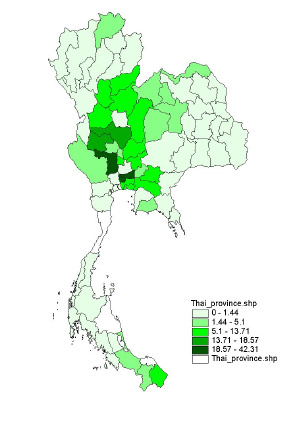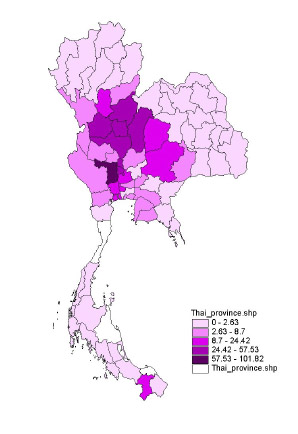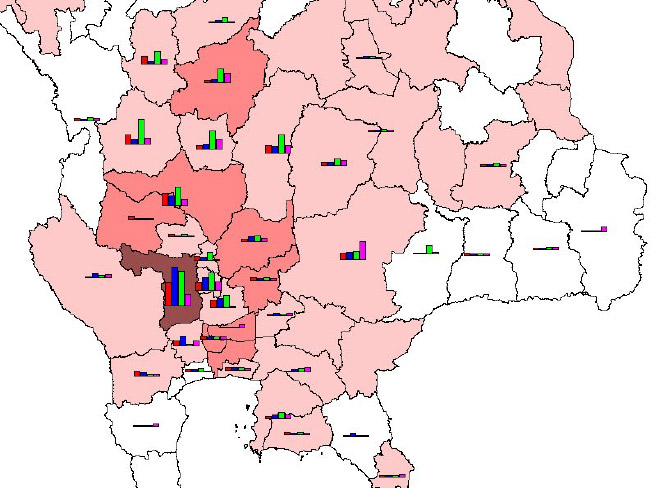|
Thailand Experience on Control of HPAI and Lesson Learnt
Bureau of Disease Control and Veterinary Services
Department of Livestock Development
Ministry of Agriculture and Cooperatives, Bangkok, Thailand
|
Highly Pathogenic Avian Influenza (H5N1) Outbreaks
1. Initials : 23rd January - 21st April 04
2. Single emerging case : 24th May 04
Total 190 cases in 89 districts of 42 provinces
Destroyed about 30 million birds, 100% compensation
Human : 8 deaths from 12 confirmed cases
3. Re-occurrence : 3rd July - 30th September 04
Total 288 Suspected cases, 187 Positive in 38 provinces (101Neg)
Destroyed about 852,374 birds, 75 % compensation
Human : 2 deaths 1 recovery from 3 confirmed cases and 1 death of probable case
4. Current Situation: 1st October 04 - 9 December 04
Total 1272 suspected cases 759 positive in 51provinces
71 subdistricts in 19 provinces are under 21-day surveillance
Destroyed about 1.2 million birds
Human : 2 deaths from 2 confirmed cases
|
 
3 July - 30 Sep 2004 October 2004 |
 |
H5N1 Subtype Control Measures in Thailand
HPAI is a National Agenda : 1
Establishment of National HPAI Committee by the Command of the Prime Minister
comprising 29 members from 13 Ministries as well as Academicians, all Associations and
Private sectors involved
- To be a decision making body
- Chaired by the Vice Premier, Ministers of the MOPH & MOAC are both vice -chairmen
- Representatives are Permanent Secretaries, Director or Secretary-Generals and Senior Officials
Establishment of 4 National Sub-Committees on
- HPAI Resolution (15 members)
- Technical Assistance
- Poultry Raising Strategy
- Public Relations
HPAI is a National Agenda : 2
Establishment of National HPAI Operating Centre including 4 Working Groups
Establishment of National Working Group on AI Resolution Strategic Development
Establishment of 76 Provincial HPAI Centres, chaired by the Provincial Governor,
includingDistrict HPAI Centres in each province.
HPAI is a National Agenda : 3
MOPH Establishment of Human HPAI Disease Control (more than 2000 patients under surveillance)
- Department of Disease Control
- Bureau of Epidemiology
- Department of Medical Science
- Medical Faculties of Universities
- All hospitals in every province
DLD Establishment of:
- HPAI Disease Control Operating Centre
- Commissions & Sub - Commissions
- Working Groups
|
HPAI Strategic Controls: 1
- Stamping-out policy with 75% compensation by law
- Quarantine (affected premises and surrounding/risk areas)
- Movement Control (Testing, Clinical observation & Permit)
- Surveillance & Monitoring in human, poultry, wild & migratory birds (and pig at epidemiological risk)
- Biosecurity enhancement of poultry farms/premises/holdings (bird proof), registration and accreditation
- Improvement of Slaughterhouses & Processing Plants in hygiene & sanitation to standards
- Re-structuring Thailand traditional duck raising
- Poultry identification (fighting cocks & pet birds etc.)
HPAI Strategic Controls: 2 "These are the MUST to do, once there were HPAI outbreaks in the country"
- Rehabilitation programmes for affected parties
- Public awareness/education and farmer training
- Co-operation from all concerned including media
- HPAI Research (mutation & epidemiology) and Development
HPAI Strategic Controls: 3
Short-term strategy: Active surveillance
Objective: 1. Early HPAI detection, 2. Reduce reservoirs & virus load in the environment
Methodology:
- Clinical observation to the "HPAI case definition"
- Nationwide sampling to the epidemiology principles including aquatic & migratory bids
- Routine testing in breeders & before movement
Thailand conducted during 1st - 31st October 2004
|
Stamping-out Policy (75% COMPENSATION by the Laws of Animal Epidemics)
- Depopulation of all susceptible species in the infected / suspicious farms
- Including farms in surrounding area within radius of 5-3-1 km depending on
epidemiological risks
Disinfection & Dispos
- Disinfection
Buildings pens, Equipment in farm & egg trays, Vehicle, Human (footbath & clothing),
Waste
- Disposal
Carcass, Products, Eggs, Feed, Bedding & Manures
Quarantine & Movement Control
- Quarantine = No movement allowed for a period
- Movement control = restriction or with conditions
- Provincial taskforce = Governorfs Supervision
- Imposed for :- all poultry & their products in
Farms (infected/suspected), Area (administrative, epidemiologically risks),
Transportation (avian spp, eggs & products, INCLUDING feeds -beddings-manures),
Live birds prohibited for Exhibition-Fighting Arena-Markets during active outbreak
in such areas
Animal Movement Management (1)
- Declaration of infected boundary by Provincial Governor
- Initially, 65 checkpoints established to control poultry movement within the country, in extra from the 44 Animal Quarantine Stations and their mobile units in 42 responsible provinces
- Now that 32 checkpoints have been set-up around the Central Thailand for more effective movement control
- There has been a co-operation among the DLD veterinary inspectors, police/military task force and/or other relevant parties under a supervision of the Provincial Governor to set-up a few mobile units or checkpoints in a province, deemed necessary
Poultry Movement Management
- Any farmed broilers destined for slaughter, the birds shall be sampled at 35 days of age (8 days sparing for labiratory result i.e 43 days at slaughter)
- Clinical observation prior to an immediate movement & the permit issuance, which will be valid for 4 days
- Movement document inspection by the checkpoints, AQS or mobile units offifials en route
- Identification document (or Passport) needed for other poultry movement, at first stage for fighting cocks, later for other (pet) birds etc.
Biosecurity Enhancement
- Farm management
All in & all out system
Strict hygiene & sanitation measures
Reduce in- coming/out-going persons & vehicles
Bird-proof netting or Evaporated housing
Routine testing for breeder flocks (every 60 days)
Registration & Licensing farms for traceability
- Cleaned Wet-Markets (MOPH Cooperation)
Strict hygiene & sanitation measures
Sale only birds from licensing farms
|
HPAI Outbreak Responses
- Establishing DLD AI Control Operating Centre (collecting & collating all information, situation analyses, reporting, control strategy proposition for decision makers, preparing all information for press release and communication) working around the clock
- Establishing DLD "Call Centre" corresponding 24 hrs with general publicBudget for implementing outbreak responses
(Compensation scheme, Appointment of ad hoc task forces and duties assignments, including Reports to authorities/parties concerned, Regularly monitoring, analysis & Weekly evaluation of the outbreak situation)
- More budget allocation for the rehabilitation programmes from the government following the outbreaks, in order to assist all affected farmers and poultry business to resume their careers with better hygiene/standards than ever for disease prevention & system managements etc.
- "HPAI Case definition" establishing for active clinical surveillance
- Outbreak investigation, active & passive epidemiological surveillance and disease monitoring
- Export prohibition from all infected areas
- Prohibition on poultry gathering e.g. exhibition, breed or singing bird contests, cock fighting etc.
- "Disinfection Campaign" (poultry holdings, farms, slaughter/processing plants and/or wet markets) during the active outbreaks as accessory measures
- Further establishment and revision of Poultry Farm Standards & Restocking Criteria (21 days + another 39 or 69 days)
- Registration of all poultry/birds raisers, farms/premises/holdings, salers & distributors, all slaughterhouses & processing plants etc.
- Standard accreditation of farms & plants
- Public awareness to farmers & general consumers
- Training and education for poultry farmers before restocking with HPAI prevention
- National cooperation: Office of PM, MOAC, MOPH, Police/Military, etc. & the Governors
- International coordination: OIE-FAO-WHO Vet Authorities of trading partners etc. |
To the next page |
|
|



